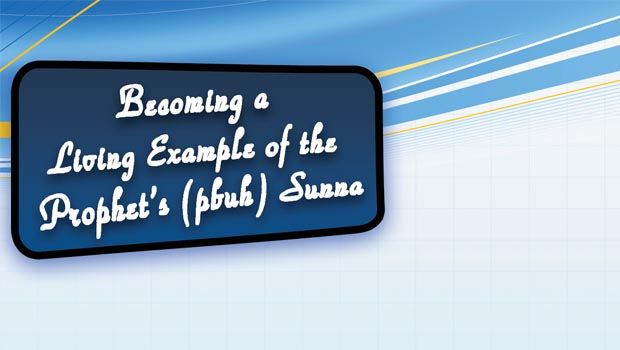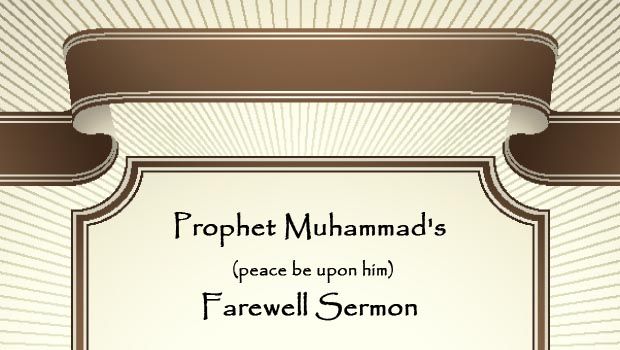The Quran’s major claim upon us is to put its teachings into practice for Allah demands the whole of our lives: “O you who have attained to faith! Surrender yourselves wholly unto God, and follow not Shaytan’s footsteps, for, verily, he is your open foe” (Al-Baqara 2:208).
The only way to live by the Quran is to live life as the Prophet Muhammad, peace be upon him, lived it, for his life was the Quran in practice. His example is the surest guide to its meaning and message. If you want to “see” the Quran, then look at the Prophet’s life. For, as Sayyida Aisha said, “His conduct was nothing but the Quran” (Muslim). The best way to understand the Quran and follow its message is to learn what the Prophet said, spend hours and hours in his company through studying the Sunna, follow his footsteps and transform yourself according to the ideal that he left behind.
The Position of the Sunna in Our Life
If you desire to know what type of person the Quran wants you to be and what type of society the Quran wants you to create, you only need to look at the Prophet’s life history. Knowing, however, is not enough. We require inner strength to follow the Quranic teachings. We need to have the real flavor of faith inside our hearts. This strength comes out of the love that a Believer must have for Allah and His Messenger. Anas, may Allah be pleased with him, reported that the Prophet said: “There are three types of people who will experience the sweetness of faith: he to whom Allah and His Messenger are dearer than all else; he who loves a human being for Allah’s sake alone; and he who has as great abhorrence of returning to unbelief after Allah has rescued him from it as he has of being cast into hell” (Bukhari, Muslim).
This love is not merely the profession of faith. It is a love that supersedes all other types of love and a love that makes faith penetrate into the heart. It is through this love for God and His Messenger that one tastes the real sweetness of faith. The way to that love and the symbol of that love lies in following the footsteps of the Prophet who was commanded by Allah to say: “If you love Allah, follow me; Allah will love you and forgive you your sins. For Allah is Oft-Forgiving, most Merciful” (Al-i’-Imran 3:31).
By the time the Prophet, peace be on him, departed this world, there were thousands of people whose lives mirrored his life. He left behind a society whose every aspect carried his stamp. His guidance, his teachings, his actions and his sayings not only fashioned that society during his time, but also continued to influence it after he had died. He created a new society and led the creation of a new civilization and culture out of the teachings of the Quran.
The Prophet’s Mission
Muhammad, upon whom be peace, was not simply a “Messenger” who brought a “Message.” His responsibility and his task went beyond merely conveying the word of Allah to mankind. He was assigned the duty of teaching the Book, the Law, and the Wisdom to people, purifying them and making them develop into the human beings that the Quran desired them to be.
In many places in the Quran, these duties have been explicitly mentioned. In the very first part of Sura al-Baqara, Prophet Ibrahim, on whom be peace, prayed for a new Messenger: “Our Lord! Raise up in their midst a Messenger from among them who shall recite to them Your verses and instruct them in the Book and in Wisdom, and purify their lives. Verily, You are Mighty, Wise” (Al-Baqara 2:129).
In other places in the Quran (see 33:4-5; 5:67; 2:151; 48:28; 9:33; 61:9; 7:157), Allah has described the Prophet’s mission and duty as: indhar (warning); tabshir (bringing glad tidings); dawa (inviting and calling); tabligh (communicating); tadhkir (reminding); talim (teaching); tilawa (conveying and propagating); amr bil-maruf wa nahi anil munkar (enjoining and promoting what is good and right and forbidding and eradicating what is bad and wrong); iqama (establishing the din or way of life); qist (establishing justice); izhar (making Divine guidance prevail); shahada (witnessing). All these expressions pertain to the same mission, though from different perspectives and with different emphases.
It was to accomplish these duties assigned to him that the Prophet Muhammad spent his whole life in changing people’s behavior and establishing a new society. The Quran accords him a unique position which no one else can ever have: “Whoever obeys the Messenger, indeed, he has obeyed Allah” (An-Nisa 4: 80).
Guidelines in Studying the Sunna
One may ask where the Sunna can be found as there are so many books and traditions circulated. What the Prophet has left behind, however, is not merely a record of what he did or what he said. He left behind him living human beings and a living society. It is through these living human beings and through this society that one can find the Sunna. The degree of homogeneity, conformity, and consistency that you find in this Umma, even after 1,400 years, are because of this Sunna.
You can walk into any masjid from Indonesia to Washington and you will find the rites and rituals of the formal acts of worship and the language of prayer almost identical. You can walk into any Muslim home and you will find every Muslim eating with his right hand. Why? Because that is the Sunna left behind by the Prophet. The latter example may seem trivial to some, but my purpose is to point out that even on the minutest of details, uniformity exists in the Muslim Umma and this is due to the Sunna.
Sunna in the Context of Western Society
To survive and prosper in Western society requires great courage to stand up for your beliefs and ideals. You need to have a clear appreciation of the true nature of Islamic culture. The vital spirit of Islamic culture lies in an understanding that the truest realities of life are all beyond the perception of physical senses.
The Prophet faced a similar situation. As he came down from the cave of Hira, after his experience of receiving the light of Divine guidance, he re-entered a culture and society which were quite “foreign” to his Message. His Message began by linking the whole of life to the name of Allah. That was the starting point. All knowledge, all culture, all civilization, and all human action must be centered on one pivot and that is the name of Allah. This was a totally strange Message for the society in which he had to operate.
Your Mission
Dawa (outreach) is the first and most important duty for Muslims today. In your daily affairs, it is the Sunna that must be uppermost in your mind and heart. It must make the greatest claim on your time and wealth. Secondly, you have to preserve your Islamic identity — not only through rational discussions with others in making dawa, but also through whatever you express in your day-to-day life in your attitudes, speech, behavior, habits, traditional customs, social manners, and morals. It is only the Sunna that can provide the standards and characteristics by which you will not only preserve your identity but strengthen and advance it.
Thirdly, it is the youth who must claim your major attention for that is also the Sunna of the Prophet. They were the people who had the energies and capabilities to carry the burden of his mission. Fourthly, in a society where so many misgivings about Islam prevail, where Islam has been misrepresented and distorted so widely, your conduct must be a living example of not only the justice but also the mercy that Islam ordains for humanity. You can embody that mercy, just as the Prophet was rahmatun lil-alamin, a mercy to the worlds. “We sent you not but as a mercy for all the worlds” (Al-Anbiva 21: 107). Prophet Muhammad was such a model of mercy that he declared that removing an obstacle from another’s path leads one into Paradise; to quench the thirst of a dog entitles one to enter Paradise; and to tie a cat until he dies makes one deserve Hellfire. Such was the mercy of his uswa, his living example. You will only be able to invite people to Islam if you follow his example.
Summary
We need to recognize the unique position that the Prophet must occupy in our lives as a focus of our love and obedience and as an ideal we must follow. Our biggest challenge is to fulfill our role as ambassadors of the last Ambassador of Allah to mankind for all times. By our words and deeds, by our example of integrity and compassion, we must make our neighbors understand who Muhammad, peace be upon him, was and what his Message for mankind was. In this process, we must be the embodiment of mercy that the Prophet was. In this way we will create a new future by making the new generation a living example of his Sunna. Then, perhaps, our presence in this world will prove a great blessing, not only for the Muslim community, but for all mankind.






